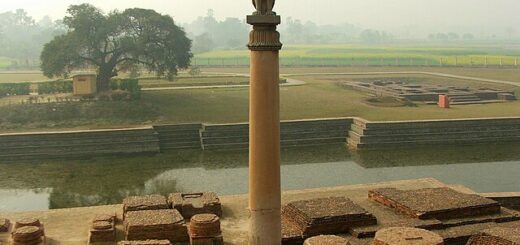The Stolen Boat, a poem by William Wordsworth
Kannada translation
Summary of the poem “The Stolen Boat”
In William Wordsworth’s poem “The Stolen Boat,” the speaker describes a captivating and transformative experience while rowing a boat on a silent lake. The poem explores themes of awe, solitude, and the power of nature to inspire and unsettle the human mind.
Meaning
One summer evening (led by her) I found
A little boat tied to a willow tree
Within a rocky cave, its usual home.
Straight I unloosed her chain, and stepping in
Pushed from the shore. It was an act of stealth
One summer evening, I followed someone (a friend or a guide) to a special place where I discovered a small boat tied to a willow tree inside a rocky cave. It seemed like the boat belonged there, as if it was its regular spot. Without making any noise, I untied the boat and climbed aboard. Then, I gently pushed the boat away from the shore, trying to be quiet and secretive. It was like a secret adventure!
And troubled pleasure, nor without the voice
Of mountain-echoes did my boat move on;
Leaving behind her still, on either side,
Small circles glittering idly in the moon,
Until they melted all into one track
As I moved the boat, I felt a mix of excitement and unease. The sound of echoes from the surrounding mountains accompanied my boat’s journey. As the boat glided through the water, it left behind small, sparkling ripples on both sides. These ripples shone brightly in the moonlight, creating a beautiful trail that merged into one continuous path. It was as if the boat was leaving a magical mark on the water.
Of sparkling light. But now, like one who rows,
Proud of his skill, to reach a chosen point
With an unswerving line, I fixed my view
Upon the summit of a craggy ridge,
The horizon’s utmost boundary; far above
As I looked up, there was nothing but the stars twinkling in the grey sky. The boat I was in seemed magical, like a small fairy boat. I rowed with energy and enthusiasm, plunging the oars into the calm lake. With each stroke, the boat glided gracefully through the water, moving forward as smoothly as a swan swimming.
Was nothing but the stars and the grey sky.
She was an elfin pinnace; lustily
I dipped my oars into the silent lake,
And, as I rose upon the stroke, my boat
Went heaving through the water like a swan;
As I looked up, there was nothing but the stars twinkling in the grey sky. The boat I was in seemed magical, like a small fairy boat. I rowed with energy and enthusiasm, plunging the oars into the calm lake. With each stroke, the boat glided gracefully through the water, moving forward as smoothly as a swan swimming.
When, from behind that craggy steep till then
The horizon’s bound, a huge peak, black and huge,
As if with voluntary power instinct,
Upreared its head. I struck and struck again,
And growing still in stature the grim shape
Suddenly, from the hidden side of a rocky cliff, a massive and dark peak emerged. It seemed to rise up on its own, as if it had a will of its own. I kept rowing and hitting the water with my oars, trying to escape from this imposing and eerie shape. But the more I rowed, the taller and more intimidating the peak became.
Towered up between me and the stars, and still,
For so it seemed, with purpose of its own
And measured motion like a living thing,
Strode after me. With trembling oars I turned,
And through the silent water stole my way
The enormous peak stood tall, blocking my view of the stars. It felt like it had a purpose and was moving deliberately, almost like a living creature. It continued to follow me as I tried to row away, causing fear and unease. I turned my oars with trembling hands, trying to navigate through the quiet water in an attempt to escape its presence.
Back to the covert of the willow tree;
There in her mooring-place I left my bark,—
And through the meadows homeward went, in grave
And serious mood; but after I had seen
That spectacle, for many days, my brain
I returned to the hidden spot where the willow tree stood, and I left the boat there, tied up as it was before. I walked back home through the meadows with a serious and thoughtful expression. However, the image of the massive peak and the strange encounter stayed in my mind for many days. It occupied my thoughts and affected the way I perceived things.
Worked with a dim and undetermined sense
Of unknown modes of being; o’er my thoughts
There hung a darkness, call it solitude
Or blank desertion. No familiar shapes
Remained, no pleasant images of trees,
Of sea or sky, no colours of green fields;
But huge and mighty forms, that do not live
Like living men, moved slowly through the mind
By day, and were a trouble to my dreams.
After witnessing the strange sight, my mind was filled with a vague and uncertain feeling. It was like I was experiencing unknown ways of existence. A darkness loomed over my thoughts, a feeling of loneliness or abandonment. I couldn’t picture familiar things anymore – no trees, no sea or sky, no green fields. Instead, my mind was filled with colossal and powerful forms that were not alive like humans. These images troubled me during the day and invaded my dreams at night.
Summary
“The Stolen Boat” by William Wordsworth is a poem that explores how nature can affect our thoughts and feelings. It tells the story of a person who finds a small boat tied to a tree in a cave. They set the boat free and go on a journey alone. The boat moves smoothly through the water, reflecting the moonlight and creating a sparkling path. The person’s attention is drawn to a faraway ridge, tall and rocky, surrounded by stars and a grey sky. The boat represents freedom and exploration as it moves gracefully like a swan.
But the peaceful moment is interrupted when a huge peak appears from behind the ridge and starts following the boat. This makes the person feel afraid and uncertain. They turn the boat around and go back to the safety of the tree, leaving the mysterious peak behind.
The encounter with the peak leaves a lasting impact on the person’s mind. They feel unsure and start questioning their existence. The familiar sights of nature disappear, replaced by strange and unsettling forms that stay in their thoughts day and night. They feel alone and struggle to understand these unfamiliar things.
In this poem, Wordsworth shows how nature can make us think deeply and reflect on ourselves. The stolen boat represents the person’s desire for freedom and exploration, while the looming peak symbolizes the unknown and overwhelming parts of life. The contrast between the peaceful lake and the unsettling peak highlights the complex emotions we experience when we are alone and thinking about ourselves.
“The Stolen Boat” encourages us to appreciate the impact nature can have on our inner selves. It reminds us that even in uncertain and dark times, there is beauty to be found and lessons to be learned. Wordsworth invites us to embark on our own journeys of self-discovery and to value the transformative power of nature.
Overall, “The Stolen Boat” reminds us to take time to reflect and find comfort in the beauty and mysteries of nature. It teaches us to embrace moments of solitude and uncertainty as opportunities for personal growth.
Exercise
I. Answer briefly the following questions.
1.Who does ‘her’ in the first line refer to?
Answer: The cool summer breeze.
2.Where was the boat moored?
Answer: Inside a rocky cave, tied to a willow tree.
3.What does ‘home’ in line 3 refer to?
Answer: The place where the boat was usually moored.
4.What does ‘her’ in line 4 refer to?
Answer: The boat.
5.Why does the poet use words like ‘home’ and ‘her’ while talking about the inanimate boat?
Answer: The attraction of the boat to the boy is so much that it acquires a human presence in his mind.
6.What stealthy act does the boy commit?
Answer: The boy takes away the boat without the permission of the owner of the boat.
7.What sound is captured in lines 6 and 7?
Answer: Mountain-echoes of the sound of the oars splashing in the water.
8.What visual picture is created in lines 8 to 10?
Answer: The picture is of small ripples caused in the water by the moving oars, and their fading away to leave only a long stretch of reflected moonlight in the water in the wake of the boat.
9.What does ‘they’ in line 10 refer to?
Answer:The small ripples in the water.
10.How many peaks are mentioned in the poem? Which one is bigger?
Answer: Two peaks are mentioned: The first one is a craggy ridge, the one the boy wanted to reach; the second one is a black and huge peak which looms suddenly in front of him.
11.a) What is the boat compared to in line 19 and 20?
Answer: A swan gliding smoothly in the water.
b) The purpose of the comparison is
a. to highlight the beauty and grace of the swan
b. to highlight the beauty and grace of the boat
c. to highlight the graceful movement of the boat
Answer:(c) to highlight the graceful movement of the boat.
12.In the expression ‘troubled pleasure’ (line 6).
a) What pleasurable experience of the narrator does ‘pleasure’ refer to?
Answer: Taking the boat away all by himself.
b) The narrator’s pleasure is ‘troubled’ because
a. his conscience pricks him on his stealthy act
b. the pleasure is short-lived
c. he is scared of his stealthy act being found out
Answer:(a) his conscience pricks him on his stealthy act-
13.Read carefully lines 21 to 26
b) Pick out the details of the peak that appears fearful to the boy
Answer:Rising from behind the craggy ridge all of a sudden; Being black and huge in size; Went on growing in size till it towered between the boy and the stars; Seemed to be coming after the boy with a measured step.
c)The lines refer to the movement of the peak. Is it real or imagined by the boy?
Answer:It is the imagination of the boy who is already feeling guilty about his act of stealing the boat.
d) In the boy’s imagination, the movement is
a. threatening and menacing
b. lively and graceful
c. friendly and inviting
Answer:(a) threatening and menacing.
14.a) In the phrase “trembling oars”, who is trembling?
Answer:The boy is trembling.
b) Name the figure of speech in this expression.
Answer:The figure of speech used here is “Transferred Epithet”.
c) The boy is trembling because of
a. He is frightened by the ‘approaching’ peak
b. Of his guilty conscience
c Of cold
Answer:(a) He is frightened by the ‘approaching’ peak.
15.The episode of the stolen boat ends with the boy leaving the boat back in its mooring place (line 32). The remaining lines of the poem (lines 33 to 44) deal with
a. the lasting memory of the actual experience
b. details not connected with the actual experience
c. the mysterious shapes and images haunting him
Answer:(c) the mysterious shapes and images haunting him.
16.Wordsworth defined poetry as “emotion recollected in tranquility”. What dominant emotion of the boat experience is recollected by the poet?
Answer:Fear caused by the sight of the huge, black peak.
17.Many days after the stolen boat experience, the narrator was haunted by a mysterious presence within him. Pick out details of this mysterious presence from lines 37 to 44.
Answer:After the experience, there hung over the boy’s thoughts darkness which can be called solitude or blank desertion. There were no familiar shapes or pleasant images of trees, sea or sky. There were just huge and mighty forms that do not live like living men. These forms moved slowly through his mind by day and troubled him in his dreams.
II. Close Study
Read the following extracts carefully. Discuss in pairs and then write the answers to questions given below them.
She was an elfin pinnace
- What does ‘she’ refer to?
- What is the figure of speech used here?
- What does ‘elfin’ mean?
- What is the figure of speech used in ‘elfin pinnace’?
- What quality in the movement of the boat is highlighted in the comparison?
Answers:
- The little boat.
- Personification.
- Very small in size.
- Metaphor.
- The smooth, pleasant and light movement of the boat.
Question 2.
With trembling oars, I turned, And through the silent water stole my way Back to the covert of the willow tree.
- What is the figure of speech used in the first line?
- What made the boy tremble?
- What does the boy want to do with the boat?
Answers:
- Transferred Epithet.
- The sudden presence of the huge, black peak which seemed to move with a measured step towards him.
- The boy wanted to take the boat to a craggy ridge.
III. Paragraph Writing
Discuss in groups of 4 each the answers to the following questions. Note down the important points for each question and then develop the points into one paragraph answers.
1.Why did Wordsworth say that his moving the boat is an act of stealth? Why was he guilty of his act?
Answer: Probably because the boy was very young, he was not allowed to row it on his own, or probably the owner of the boat did not like anyone touching his boat. Here the boy does not inform the owner or take his permission to use the boat. Hence Wordsworth says that the boy’s moving of the boat is an act of stealth. It was an act of stealing and his joy and thrill of adventure were troubled by a sense of guilt.
2.Describe the effect that the spectacle of the peak had on the poet’s mind.
Answer: The poet wanted to take the boat near a craggy ridge, but the sudden appearance of the huge, black peak unnerved him. The more he rowed the boat, the bigger the peak seemed to become in front of him. Soon it seemed to move with a measured step like a living being towards the poet. This made the poet turn back towards the rocky cave.
3.To Wordsworth, nature was a living presence. Pick out any 5 details from the poem to support this.
Answer:‘One summer evening’; ‘small circles glittering idly in the moon’; ‘she was an elfin pinnace’; ‘my boat went heaving through the water like a swan’; ……… a huge peak, black and huge, as if with voluntary power instinct, upreared its head.’
The Poem
One summer evening (led by her) I found
A little boat tied to a willow tree
Within a rocky cave, its usual home.
Straight I unloosed her chain, and stepping in
Pushed from the shore. It was an act of stealth
And troubled pleasure, nor without the voice
Of mountain-echoes did my boat move on;
Leaving behind her still, on either side,
Small circles glittering idly in the moon,
Until they melted all into one track
Of sparkling light. But now, like one who rows,
Proud of his skill, to reach a chosen point
With an unswerving line, I fixed my view
Upon the summit of a craggy ridge,
The horizon’s utmost boundary; far above
Was nothing but the stars and the grey sky.
She was an elfin pinnace; lustily
I dipped my oars into the silent lake,
And, as I rose upon the stroke, my boat
Went heaving through the water like a swan;
When, from behind that craggy steep till then
The horizon’s bound, a huge peak, black and huge,
As if with voluntary power instinct,
Upreared its head. I struck and struck again,
And growing still in stature the grim shape
Towered up between me and the stars, and still,
For so it seemed, with purpose of its own
And measured motion like a living thing,
Strode after me. With trembling oars I turned,
And through the silent water stole my way
Back to the covert of the willow tree;
There in her mooring-place I left my bark,—
And through the meadows homeward went, in grave
And serious mood; but after I had seen
That spectacle, for many days, my brain
Worked with a dim and undetermined sense
Of unknown modes of being; o’er my thoughts
There hung a darkness, call it solitude
Or blank desertion. No familiar shapes
Remained, no pleasant images of trees,
Of sea or sky, no colours of green fields;
But huge and mighty forms, that do not live
Like living men, moved slowly through the mind
By day, and were a trouble to my dreams.





























Its little useful thank you for adding answers
It’s useful for 10th 1st language English tq for posting